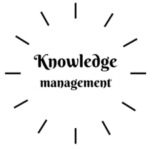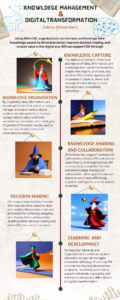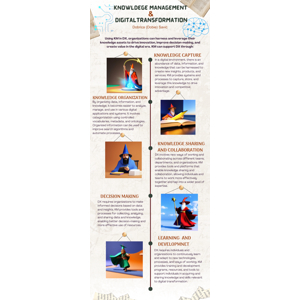This infographic provides an overview of the ways in which knowledge management can facilitate a successful digital transformation. It highlights the importance of capturing and organizing knowledge and information, sharing it across departments and teams, and collaborating to leverage collective intelligence. Ultimately, by adopting effective knowledge management practices, organizations can create a competitive advantage, adapt quickly to change, and thrive in the digital age.
 In today’s fast-paced digital environment, a company’s success depends largely on its ability to undergo a successful digital transformation. However, digital transformation is not just about incorporating new technology. It also requires significant changes in organizational processes, structures, and culture. This is where knowledge management practices can play an important role.
In today’s fast-paced digital environment, a company’s success depends largely on its ability to undergo a successful digital transformation. However, digital transformation is not just about incorporating new technology. It also requires significant changes in organizational processes, structures, and culture. This is where knowledge management practices can play an important role.
 Knowledge management involves identifying, creating, sharing and using information and knowledge in an organization. By implementing effective knowledge management practices, companies can foster a culture of knowledge collection, increase its efficient organization, sharing and collaborating. All this can lead to better decision-making and improved continuous learning and development.
Knowledge management involves identifying, creating, sharing and using information and knowledge in an organization. By implementing effective knowledge management practices, companies can foster a culture of knowledge collection, increase its efficient organization, sharing and collaborating. All this can lead to better decision-making and improved continuous learning and development.
This informative infographic highlights the various ways in which knowledge management can play a critical role in achieving successful digital transformation. It emphasizes the significance of collaborative efforts in gathering, organizing, and sharing knowledge and information across different departments and teams to leverage collective intelligence. By implementing effective knowledge and information management practices, organizations can gain a competitive edge, respond quickly to changes in the digital landscape, and flourish in the digital age. Overall, this infographic serves as a valuable resource for businesses seeking to optimize their knowledge management strategies and drive successful digital transformation.






